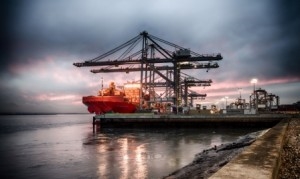
BBC Radio 4 called on the expertise of our Director General, Lesley Batchelor on Budget day this week for a live interview with Today programme presenter, Nick Robinson, on the slowdown of the world economy and how it affects British exports.
The interview was set against the backdrop of the London Gateway super port. Operating at just a third of its projected final capacity, London Gateway symbolises how sluggish trade remains a major concern across ports throughout UK – with the global world shipping slump deepening following China’s surprise devaluation.
Before the interview, the programme highlighted how the Chancellor had set huge store on the contribution of Britain’s global trading performance to economic recovery – announcing in 2012 that it should double exports to a trillion pounds a year by 2020.
You can listen to the interview here (between 53.14 and 57.05) until April 16 -or read it in full below:
Nick Robinson – Last year, export figures were just over half a trillion ponds and we are on course to miss the Chancellor’s target by at least a third. So why? Lesley Batchelor, Director General of the Institute of Export, is here to tell us. This place where we are sitting illustrates the problem of having a grand ambition for trade and the reality of chill winds coming up the Thames.
Lesley Batchelor – Yes, chill winds indeed. Certainly the world economy has just flattened. It’s just completely flat and it’s all very well wanting to export out of a recession but somebody somewhere has got to be buying your product so somebody’s got to be importing it. All the countries have the same idea so we need to be better and sharper about what we do.
Nick Robinson – So when the Chancellor was talking recently about this cocktail of risks that he would have to describe today in his Budget, the chill winds that were in China let alone here on the Thames that is a real problem for those export markets?
Lesley Batchelor – Well it is, but of course China isn’t the only market out there; we do know that people could find niches that they can export to and certainly for our products which are of a high quality. What we’ve really got to do is encourage people to want to export and actually engage in this as a practice.
Nick Robinson – So it’s things not just services; here we see these massive containers full of goods, but frankly there’s just a lot more stuff coming in than ever goes out isn’t there?
Lesley Batchelor – Yes we certainly do, we import so much more than we export and we really must change that if we’re going to actually get out of this trade deficit that we’re in at the moment.
Nick Robinson – Why is that proving such a difficulty? What do you think the Chancellor could do about it?
Lesley Batchelor – The difficulty is that as a nation we don’t seem to think of international trade in terms of a new market and actually, we don’t think of it as an investment because it’s a lot of money, upfront that you’ve got to use to get out there. You’ve got to research the market and try to find the right channels, and you’ve also got to do things like commit to localising your website, translating documents, trying to get through all that. And the second part, to answer your question about what he (the Chancellor) can do, I honestly think if he could muster some tax relief on those heavy investments you make upfront, that would make a huge difference to incentivising people to actually try more.
Nick Robinson – There’s long been a debate, hasn’t there, on whether the government, in a sense, should step back and let business get on with it or whether it has to do more handholding. I get the sense that you think that people can easily take the step into exporting and then suddenly find it’s rather harder than rhetoric suggested?
Lesley Batchelor – Yes this is exactly what we find. The government went back and visited companies that they’d helped to export six years ago and, six years on, they find that 50% of them have stopped and it’s our conclusion that actually what they don’t do is learn the detail of how to do the rest of the exporting. Making the sales all very well but you’ve got to come up with the rest of the project as well.
Nick Robinson – Germany continues to expand its trade; are they just better at this? Do they just have better instincts and better government support?
Lesley Batchelor – No, they probably have better government support in some ways but what they also have is larger companies and we have a proliferation of very small businesses. The smaller the business the less likely they are to export; they tend to be more lifestyle businesses and we need to have some sort of incentive to get those businesses to grow into the next level.
Visit the IOE website for more information about our training, qualifications and business membership, or contact us if you have any questions.


